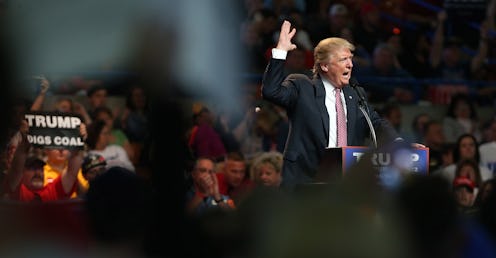News
The One Thing Missing From Trump's SCOTUS Picks
In an unusual move for a presidential candidate, presumptive Republican nominee Donald Trump revealed Wednesday the list of judges he would potentially consider appointing to replace Justice Antonin Scalia, who died in February at the age of 79, on the Supreme Court should he win the general election in November. It was a bold move aimed at assuring conservatives within the Republican Party that Trump had their best interests in mind. So while it came as no surprise that Trump's picks for potential Supreme Court nominees were overwhelmingly conservative, it was startling that the list included not one racial minority. All 11 of Trump's potential Supreme Court justices are white.
Scalia's vacant seat on the Supreme Court has become a huge talking point of the 2016 presidential election for the Republican Party as GOP senators continue to block Merrick Garland, a chief judge of the D.C. Circuit Court of Appeals with moderate leanings who was nominated to the bench by President Barack Obama in March. Since Scalia's death, the Supreme Court has been evenly divided between conservative and liberal justices. In rolling out 11 mainstream conservative judges as his potential Supreme Court justice picks, Trump is hoping to shore up support with conservatives before the general election gets underway.
"The following list of potential Supreme Court justices is representative of the kind of constitutional principles I value," Trump said Wednesday in a statement that accompanied the all-white, heavily male list. The list includes Steven Colloton of Iowa and Raymond Gruender of Missouri, two judges on the 8th U.S. Circuit Court of Appeals with records that suggest they hold conservative views on abortion and reproductive rights. Also on the list are Thomas Hardiman of Pennsylvania, a judge on the 3rd Circuit Court of Appeals; Raymond Kethledge of Michigan, a judge on the 6th Circuit Court of Appeals; and William Pryor of Alabama, a judge on the 11th Circuit Court of Appeals. Pryor is an open opponent of Roe v. Wade, having once described the ruling as providing "a constitutional right to murder an unborn child." Trump's list also includes three state supreme court judges Thomas Lee of Utah; David Stras of Minnesota; and Don Willett of Texas.
Trump's list of potential Supreme Court picks isn't big on gender diversity either. Of the eleven names reportedly under consideration by Trump, only three are women: Allison Eid, a state supreme court judge in Colorada; Joan Larsen, a state supreme court judge in Michigan; and Diane Sykes, a Wisconsin judge serving on the 7th Circuit Court of Appeals. But at least a few women made it onto Trump's radar.
What makes the lack of racial diversity on Trump's list especially troubling, however, is that Trump himself implied these 11 judges were contenders not only for Scalia's vacant seat but for any opening that may pop up on the Supreme Court bench in the next four years. "I plan to use this list as a guide to nominate our next United States Supreme Court Justices," Trump said.
Increased racial diversity is desperately needed within the U.S. judicial system as the nation's population continues to grow more and more diverse. And yet, for a variety of reasons, white men continue to dominate judicial positions. A 2010 study on improving judicial diversity by the Brennan Center for Justice, for example, found that "white males are overrepresented on state appellate benches by a margin of nearly two-to-one." The study claims "almost every other demographic group is underrepresented when compared to their share of the nation's population." Moreover, a 2014 report on U.S. Circuit and District Court Judges by the Congressional Research Center found and only 23.5 percent of active U.S. circuit court judges were not white.
It's not that Trump is obligated to nominate a non-white judge to the Supreme Court should he be elected president and should the Senate continue to roadblock Obama's nominee; he's not. But it is problematic that, although our nation grows more diverse everyday, Trump is reportedly not even considering one racial minority candidate. Instead, his lengthy list of potential contenders continues the pattern of disproportionate racial diversity found within the judicial system.
